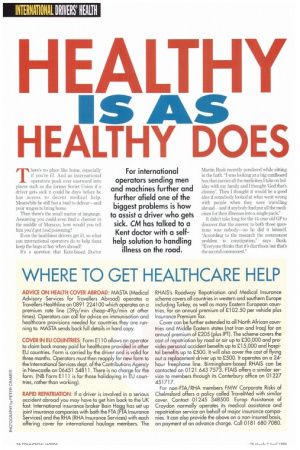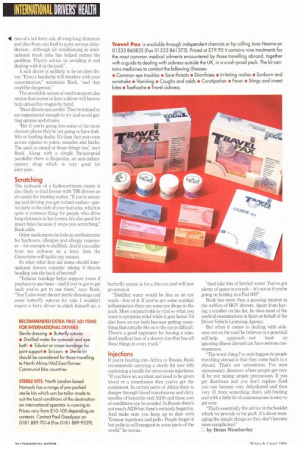HEALTHY AILS HEALTHY DOES
Page 30

Page 31

Page 32

If you've noticed an error in this article please click here to report it so we can fix it.
There's no place like home, especially if you're ill. And as international operators push ever eastward into places such as the former Soviet Union if a driver gels sick it could be days before he has access to decent medical help. Meanwhile he still has a load to deliver—and your wagon to bring home.
Then there's the small matter of language. Assuming you could even find a chemist in the middle of Morocco, how would you tell him you'd got food poisoning?
Even the healthiest drivers get ill, so what can international operators do to help them keep the bugs at bay when abroad?
It's a question that Kent-based Doctor Martin Busk recently pondered while sitting in the bath. "I was looking at a big cardboard box that carries all the medicines! take on holiday with my family and I thought God that's clumsy'. Then I thought it would be a good idea if somebody looked at what went wrong with people when they were travelling abroad—and if anybody had put all the medicines for their illnesses into a single pack."
It didn't take long for the 44-year old GP to discover that the answer to both those questions was nobody—so he did it himself. "According to the research the commonest problem is constipation," says Busk. "Everyone thinks that it's diarrhoea but that's the second commonest."
The statistics on sickness while travelling abroad make for depressing reading—a recent survey showed that one in three of the 39 million travellers going abroad from the UK each year are taken ill.
Busk's solution to the problem TravelPax is a self-help kit containing nine different medications to combat the most common ailments. Together with an advice booklet it should keep an international driver going when medical help isn't readily available.
Much of the illnesses encountered abroad are minor, or self-limiting, explains Busk: "Most diarrhoea gets better on its own, given time, but in the interim you're having to stop your vehicle every 10 minutes and find a toilet, or a bush—depending on where you are! The Loperamide in the pack can stop traveller's diarrhoea in its tracks, often with only one capsule, although if necessary you can take up to six in a day It allows you to sta. bilise the condition until you get home and see Doctor Jones."
Long-distance drivers heading into North Africa or the Middle East have their own unique problems, says Busk, not least dehydration. He recommends two to three pints of fluid taken as tea or water as a healthy target to aim at for every 24 hours. 'The combina tion of a hot lorry cab, driving long distances and diarrhoea can lead to quite serious dehydration—although air conditioning in international truck cabs has helped reduce the problem. There's advice on avoiding it and dealing with it in the pack".
A sick driver is unlikely to be an alert driver. "Even a headache will interfere with your concentration," maintains Busk, "and that could be dangerous."
The unreliable nature of road transport also means that sooner or later a driver will have to help unload his wagon by hand.
"Most drivers are careful. They're trained or are experienced enough to try and avoid getting sprains and strains.
"But if you're going into some of the more obscure places they're not going to have forklifts or loading docks, It's then that you come across injuries to joints, muscles and backs. The pack is aimed at those things too," says Busk. Along with a simple Paracetamol painkiller there is Ibuprofen, an anti-inflammatory drug which is very good for joint pain.
Scratching
The inclusion of a hydrocortisone cream is also likely to find favour with TIR drivers as it's useful for treating rashes. "If you're sweating and driving you get irritant rashes—particularly in the cleft of your buttocks, which is quite a common thing for people who drive long-distances in hot lorries. It's also good for insect bites because it stops you scratching," Busk adds.
Other medications include an antihistamine for hayfevers, allergies and allergic responses—for example to shellfish. And if you suffer from sea sickness on a ferry then the Cinnarizine will tackle any nausea.
So what other first aid items should international drivers consider taking if they're heading into the back of beyond?
"Tubular bandage helps support joints if you have to use them—and if you've got to get back you've got to use them," says Busk. "You'll also want decent sterile dressings and some butterfly sutures for cuts. I wouldn't expect a lorry driver to stitch himself up, a butterfly suture is for a thin cut and will just go across it.
"Distilled water would be fine as an eye wash—lots of it. If you've got some residual inflammation there are some eye drops in the pack. Most conjunctivitis is viral so what you want is symptom relief while it gets better. I'd also have an eye bath because getting something that actually fits on to the eye is difficult. There's a good argument for having a standard medical box of a decent size that has all these things in every truck,"
Injections
If you're hauling into Africa or Russia, Busk recommends carrying a sterile kit (see left) containing a needle for intravenous injections: "If you have an accident and need to be given blood or a transfusion then you've got the equipment. In certain parts of Africa there is danger through blood transfusions and dirty needles of hepatitis and AIDS and these sort of conditions can be avoided. In Russia there's not much AIDS but there's certainly hepatitis. And make sure you keep up to date with Tetanus injections and polio. People forget it but polio is still rampant in some parts of the world," he warns. "And take lots of bottled water. You've got plenty of space in a truck it's not as if you're going on holiday in a Fiat 600!"
Busk has more than a passing interest in the welfare of HGV drivers. Apart from having a number on his list, he does most of the medical examinations in Kent on behalf of the Driver Vehicle Licensing Agency But when it comes to dealing with sickness out on the road he believes in a practical self-help approach not least as ignoring illness abroad can have serious consequences_ "The worst thing I've seen happen to people travelling abroad is that they come hack in a shroud_ That's not uncommon. I've seen unnecessary disasters where people get very ill by not taking simple precautions. If you get diarrhoea and you don't replace fluid you can become very dehydrated and then very ill from something that's self-limiting and with a little bit of commonsense is easy to get over.
"That's essentially the advice in the booklet which we provide in the pack. It's about managing the simple things so they don't become more complicated."
I-7 by Brian Weatherley




































































































